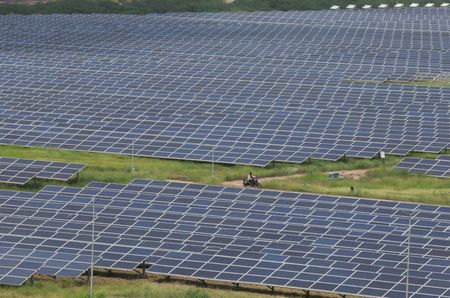By Sethuraman N R
GANDHINAGAR, India (Reuters) – India will connect a record 35 gigawatts (GW) of solar and wind energy capacity to its grid during the year ending March 2025, a top bureaucrat told Reuters, as it scrambles to achieve its 2030 clean energy target after falling short of a much publicised 2022 renewables goal.
The world’s fastest growing major economy has prioritised coal to address a surge in power demand in recent years, with growth in coal-fired power output expected to outpace renewable energy generation this year.
Commissioning of large solar farms has slowed in recent years and resulted in solar power generation growing at the slowest pace in six years during the first half of 2024.
However India, the world’s third largest solar power producer, expects that to change starting this fiscal year, when it sees fresh additions of 30 GW of solar capacity, Bhupinder Singh Bhalla, the top bureaucrat at India’s Ministry of New and Renewable Energy told Reuters.
The country will also add about 5 GW of new wind capacity, he said.
India added a total of 10 GW of renewable capacity in April-August, the first five months of this fiscal year, taking its total to about 153 GW, government data showed.
“We cannot provide an exact number for next year (2025-26), but we will definitely overtake this year’s capacity (addition),” Bhalla said on the sidelines of RE-Invest, India’s biggest renewable energy conference.
Bhalla also said there was a “lot of market demand for battery-linked storage projects,” adding that more tenders for such projects can be expected going forward.
India is still 13% short of a pledge made by Prime Minister Narendra Modi at the UN climate talks in Paris in 2015 to increase its renewable energy capacity to 175 GW by 2022.
It is the world’s third largest greenhouse gas emitter, although per capita emissions from its population of about 1.5 billion people are among the lowest among major economies.
The south Asian nation will need to add about 30% more clean capacity every year than the expected wind and solar additions this fiscal year to achieve its end-2030 target of increasing its non-fossil power capacity to 500 GW, underscoring the challenges in meeting its clean energy goals.
Renewable energy minister Prahlad Joshi said financial institutions have pledged to provide $386 billion in funding for renewable projects by 2030, adding that clean energy developers have committed to boost India’s non-fossil capacity by 570 GW.
Separately, Indian conglomerates Reliance Industries committed 100 GW of additional renewable capacity by 2030, while Adani Green Energy committed 38.8 GW of capacity.
(Reporting by Sethuraman NR in Gandhi Nagar, additional reporting by Yagnoseni Das in Bengaluru; Writing by Sudarshan Varadhan; Editing by Sonia Cheema and Susan Fenton)












